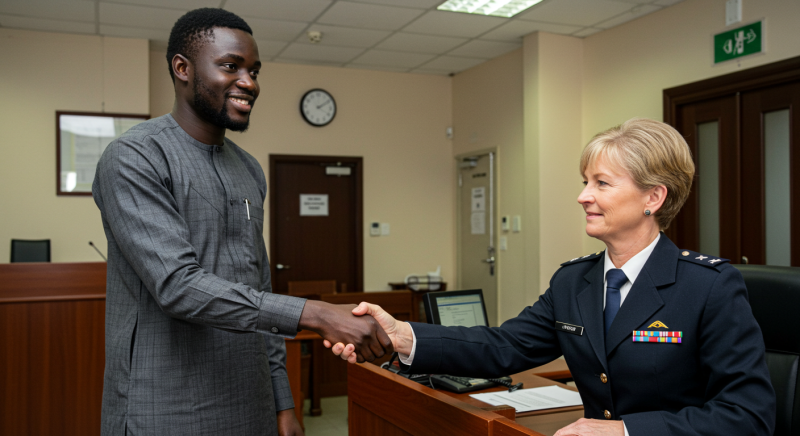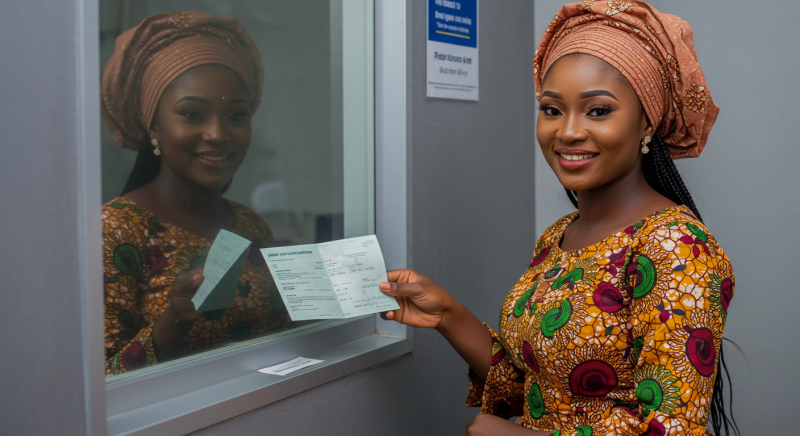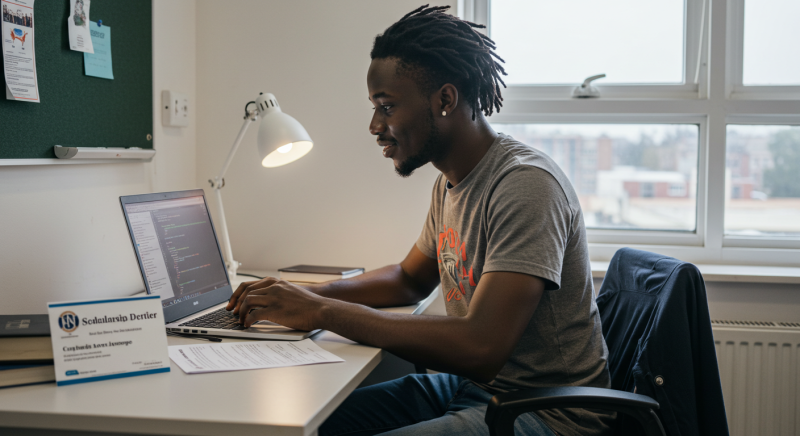Imagine sitting across from a U.S. visa officer, your palms sweating, heart racing, as you struggle to explain why you deserve that life-changing visa stamp. For thousands of Nigerians, this moment feels like standing at a crossroads between hope and despair. I remember my cousin Chidi, who spent months saving for his application, only to be denied because he fumbled a simple question about his travel plans. His story isn’t unique—Nigeria has one of the highest U.S. visa denial rates globally, with over 40% of applicants rejected in 2022 (U.S. Department of State). But here’s the good news: with the right preparation, you can turn the odds in your favor. Let’s break down how.

Key Takeaways:
✅ 4 critical documents you MUST bring to your interview.
✅ How to answer “Why do you want to visit the U.S.?” without sounding suspicious.
✅ The #1 mistake Nigerians make during visa interviews (and how to avoid it).
✅ Sample answers to 10 most common visa questions.
1. Why U.S. Visa Interviews Are Crucial for Nigerians
The U.S. visa interview is your chance to prove you’re a genuine traveler who’ll return to Nigeria. Officers scrutinize ties to home—family, jobs, assets—to ensure you won’t overstay. According to the U.S. Embassy in Nigeria, 65% of rejections stem from insufficient proof of strong home ties.
What to Do:
– Highlight stable employment (e.g., “I’ve worked at GTBank for 5 years”).
– Emphasize family responsibilities (e.g., “My elderly parents rely on me”).

Top 10 U.S. Visa Interview Questions & How to Answer Them
Question 1: “What is the purpose of your trip to the U.S.?”
Why It’s Asked: Officers want a clear, specific reason (tourism, conference, etc.). Vague answers trigger suspicion.
Sample Answer (Tourism): “I plan to visit New York for two weeks to celebrate my graduation. I’ve saved for three years and booked a return ticket to resume my job at Lagos Teaching Hospital.”
Question 2: “Do you have family in the U.S.?”
Why It’s Asked: Relatives abroad may imply immigration intent.
Sample Answer: “My sister lives in Texas, but I’m only visiting her for Christmas. I’ll return to Nigeria afterward—my husband and children stay here.”
Question 3: “Have you traveled abroad before?”
Why It’s Asked: Officers assess your travel history to gauge compliance with visa rules. Nigerians with prior travel to countries like the UK or Schengen zones often have higher approval rates.
Sample Answer: “Yes, I visited Dubai last year for a conference and returned to Nigeria as planned. My travel history shows I respect visa terms, and I’ll do the same for this trip.”
Question 4: “Who is sponsoring your trip?”
Why It’s Asked: They want proof you can afford the trip without illegally working in the U.S.
Sample Answer (Self-Sponsored): “I’m covering all expenses with my savings as a senior accountant at Dangote Group. Here’s my 6-month bank statement showing ₦3.8 million in liquidity.”
Sample Answer (Sponsored by Family): “My uncle is sponsoring my 2-week vacation. He provided a signed affidavit of support and his U.S. bank statements, but I also have ₦1.2 million in my GTBank account as backup funds.”
Question 5: “What do you do for a living?”
Why It’s Asked: Stable employment = strong reason to return to Nigeria.
Sample Answer (Employed): “I’ve been a marketing manager at Flutterwave for 3 years, earning ₦650,000 monthly. My boss approved a 10-day leave for this trip—here’s my employment letter.”
Sample Answer (Business Owner): “I run a poultry farm in Ogun State with 12 employees. My business generates ₦1.5 million monthly, and my manager will oversee operations while I’m away.”
Question 6: “Why not visit a closer country instead?”
Why It’s Asked: Tests if your U.S. travel motive is genuine.
Sample Answer: “I’ve toured Ghana and Kenya before, but this trip is special—I’m attending my best friend’s wedding in Houston. We’ve been close since university, and I’m the maid of honor!”*
Question 7: “What happens if your visa expires?”
Why It’s Asked: They’re probing for immigration intent.
Sample Answer: “I’ll return to Nigeria before my visa expires. My children’s school resumes the week after my trip, and I’ve already paid their tuition fees. Overstaying would hurt their future.”
Question 8: “Where will you stay in the U.S.?”
Why It’s Asked: To confirm you have safe, legal accommodation.
Sample Answer: “I’ll stay at the Marriott in Los Angeles for 7 nights—here’s my hotel booking. The remaining 5 days, I’ll tour San Francisco with a registered tour group.”
Question 9: “Do you plan to work or study in the U.S.?”
Why It’s Asked: Any hint of unauthorized work/study leads to instant rejection.
Sample Answer: “No, I’m only visiting for vacation. My career and family are in Lagos—I’ve even attached my LIRS tax certificate to prove my income here.”
Question 10: “When do you plan to return to Nigeria?”
Why It’s Asked: They need a concrete return commitment.
Sample Answer: “I’ll return on December 15th. My sister’s traditional wedding is on December 20th, and I’m the chief organizer. Here’s my return flight ticket and the wedding invitation.”
Bonus: Handling Curveball Questions
Question: “What if you meet someone in the U.S. and decide to marry?”
Why It’s Asked: Tests your long-term intentions.
Sample Answer: “I’m already engaged to my partner here in Abuja—we’ve set a wedding date for next year. My life and plans are firmly rooted in Nigeria.”
4 Documents Nigerians MUST Bring to the Visa Interview
1. Bank Statements: Show consistent savings (₦2 million+ ideal).
2. Employment Letter: State your role, salary, and approved leave dates.
3. Property Documents: Land deeds, rental agreements, or business licenses.
4. Travel Itinerary: Flight bookings, hotel reservations, and tour plans.
Pro Tip: Use bulletproof folders to organize documents—officiers appreciate professionalism!

Avoid These 3 Common Mistakes Nigerian Applicants Make
🚫 Mistake 1: Over-rehearsing answers (sounds robotic).
🚫 Mistake 2: Dressing too casually (wear formal attire!).
🚫 Mistake 3: Arguing with the officer (stay calm and polite).
What Happens After the Interview? Next Steps Explained
– Approved? Your passport arrives in 5–7 days via DHL.
– Denied? Reapply after addressing the rejection reason (e.g., stronger home ties).
Conclusion:
Securing a U.S. visa isn’t about luck—it’s about preparation. By mastering these questions, organizing your documents, and showcasing your ties to Nigeria, you’ll walk into that interview with confidence. Remember, thousands of Nigerians succeed every year. With this guide, you’re already one step closer to joining them.
Sources:
– U.S. Department of State Visa Statistics: [travel.state.gov]
– U.S. Embassy Nigeria Interview Tips: [ng.usembassy.gov]